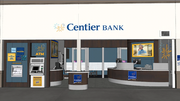Blog
A 'Bit o' Coin' and a 'Look at me!' ATM
March 12, 2014 by Richard Buckle — Founder and CEO, Pyalla Technologies, LLC
This past week I attended a dinner put on by a local investment company — from what I could tell, the audience was a small cross-section of Denver's one-percenters. As small talk continued around the table, one of the guests summed up the occasion best when he observed that there was "quite a bit of coin" around the room.
His meaning wasn't lost on any of us, who immediately scanned the room, doing a little mental arithmetic when better-known faces were recognized, but the subject of coins didn't leave me as I drove home.
However, it's coins of another type that have been catching the headlines of late — the Bitcoin digital currency. In case you missed all the excitement, the Feb. 26, 2014, issue of USA Today ran the story, "Battle for Bitcoin: Will it survive?"
The article described Bitcoin as, "a decentralized digital currency that is traded mostly online and person to person rather than through banks. Started by programmers whose identities remain anonymous, the unregulated cybercurrency has been gaining popularity in the USA and slowly entering the mainstream."
Another headline caught my attention, too. On Feb. 20, USA Today ran the article, "Bitcoin ATMs come to USA," about the first U.S. installation in Austin, Texas.
According to the report:
The ATM … will scan a user's palm print and government-issued ID to verify identity, then allow the user to add money to a virtual Bitcoin 'wallet' or withdraw the currency to a mobile phone app … The machine will also perform a one-time face recognition scan to verify identity.
'All you need is your phone, your ID, your palm and your face — all the things people carry with them on a daily basis,' [Robocoin CEO Jordan] Kelley said.
All you need is your phone, your ID, your palm and your face! Now that's something I can comprehend, as I might leave home without my wallet but rarely, indeed, will I leave home without my phone.
Yash Kapadia, CEO of OmniPayments Inc. said even though he is on the periphery of technologies such as Bitcoin, as a payments platform vendor he's watching developments closely.
"Any time you see vendors leveraging and promoting biometrics, for instance, you get my attention," he said. "In the countries I support, many of them are in emerging markets lacking the basic infrastructure you need for today's ATM networks and simple biometrics offers a way to ensure identity."
However, Yash was quick to add, "There are big issues over security as well as sovereignty — lessening the control and oversight of central banks, for instance, will be a concern for many. However, the arrival of a global digital currency isn't taking us completely by surprise."
I can see many upsides to something like Bitcoin, but is it really a currency?
According to Brian Miller, VP and GM at Lusis Payments Inc., it is not:
Bitcoin is not a currency; it's more of a commodity, like gold. Currency has backing, and the risk can be properly assessed and managed by professional traders and the Federal Reserve. Furthermore, Bitcoin is pure supply and demand. There is no backing, no security and who wants risk in their currency? Just in the last month Bitcoin has dropped from $1,200 US to less than $500. Bitcoin might mature and the risk could decline, but right now it's the Wild West!
Warren Buffett, the Oracle from Omaha, went so far as to say in a March 3 appearance on CNBC that Bitcoin isn't a currency and he wouldn't be surprised if it's not around in 10 or 20 years. Since the price keeps moving around so dramatically, he said, "It's very speculative, a Buck Rogers kind of thing, like the Dutch tulip mania in 1637".
According to a source close to ACI Worldwide and another payments vendor with considerable presence in the global ATM marketplace, "Bitcoin support has not come up as a topic from their customer base and there are no active initiatives to support it."
So, what to make of the arrival in North America of Bitcoin ATMs and their impact on banks?
Again, Brian Miller of Lusis Payments:
For Banks, ATMs are vaults for deposits and dispensing hard currency, stamps and a few other odd things. Why would a bank, consumer [or] business need to visit an ATM to purchase Bitcoin? The more logical place would be via online banking. I don't see any benefit to increasing the purchase or redemption of Bitcoins via ATM's when I could use my laptop, mobile phone, etc.
This sentiment is shared by Yash:
Bitcoin may ultimately fail. Bitcoin exchanges may prove even more vulnerable than what we have just seen in the case of the Tokyo exchange Mt.Gox. But the principles may live on — there seems to be mounting evidence to suggest that there is a legitimate use case scenario for a global digital currency and when the dust settles, everyone around the planet will want access to their funds from an ATM.
Bitcoin might not add anything to our world in its current form but, who knows, a global currency of one type of or another might prove every bit as influential as the Internet.
Miller might be right in saying, "Banks brand themselves as secure deposit taking institutions under continuing evolving compliance regulations. Right now I don't think they make good bed partners."
The Wild West! Buck Rogers! It doesn't sound encouraging for those supporting virtual currencies, but I'm not prepared to rule out their presence sometime in the future.
And I have to admit, I like the idea of Bitcoin ATMs basing identification on biometrics. Long term, I see that as a more secure form of identification requiring little by way of secondary collateral.
Every time I think about it, though, the vision of Tom Cruise in the film Minority Report comes to mind — changing eyeballs to change identity isn't something I want to contemplate for too long.
On the other hand, borrowing a line from another film, Goodfellas, "Look at me!" may cross over to the mainstream no matter what bit o' coin of the realm we rely upon.
About Richard Buckle
Richard Buckle is the founder and CEO of Pyalla Technologies, LLC. He has enjoyed a long association with the Information Technology (IT) industry as a user, vendor, and more recently, as an industry commentator, thought leader, columnist and blogger. Richard participates in the HPE VIP Community where he is part of their influencer team.
 ChatGPT
ChatGPT Grok
Grok Perplexity
Perplexity Claude
Claude












